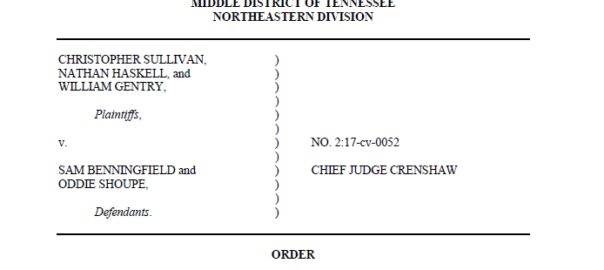Federal court orders that controversial sterilization program be rescinded; White County officials to pay Plaintiffs’ attorney’s fees, permanently enjoined from making or enforcing any sentencing determination that is based “in whole or in part upon a defendant’s consent—or refusal to consent—to becoming permanently or temporarily sterilized.”
Following an historic reversal at the United States Court of Appeals for the Sixth Circuit last month, an inmate sterilization program instituted by two White County, Tennessee officials has finally come to an end. The landmark order comes nearly two years after a trio of inmates at the White County jail filed suit against White County General Sessions Court Judge Sam Benningfield—the architect of the program—and the White County Sheriff’s Office, alleging that the program violated the 14th Amendment’s Equal Protection and Due Process clauses.
A consent decree approved by the United States District Court for the Middle District of Tennessee earlier today formally terminates the controversial inmate sterilization program, compelling Judge Benningfield to rescind each of his standing orders regarding the program “in their entirety,” effective immediately. The Court’s order also permanently enjoins both Judge Benningfield and the White County Sheriff’s Office “from making or enforcing any sentencing determination that is based in whole or in part upon a defendant’s consent—or refusal to consent—to becoming permanently or temporarily sterilized” at any point in the future. Judge Benningfield and the White County Sheriff were further ordered to pay the costs of the lawsuit and the plaintiffs’ attorney’s fees, which the order provides “shall be donated by Plaintiffs’ counsel to the United States Holocaust Memorial Museum and the Tuskegee History Center.” Each of the three inmates who sued after refusing to become sterilized also received a 30-day sentencing credit toward a future expungement.
“Inmate sterilization is despicable, it is morally indefensible, and it is illegal,” said Daniel Horwitz, a Nashville-based constitutional lawyer who represented the inmates along with Richard Brooks. “Let this historic order serve as a warning: Whether you are a sitting Judge, a Sheriff who is ‘just following orders,’ or any other government official, if you violate the Constitution, you will be held accountable.”
The Consent Decree and Final Order approved by the U.S. District Court for the Middle District of Tennessee and additional case documents regarding the program appear below.
–Consent Decree and Final Order
–6th Circuit Opinion Reversing District Court
–Plaintiffs’ Complaint for Injunctive and Declaratory Relief
–Plaintiffs’ Memorandum in Support of Summary Judgment
–6th Circuit Brief of Plaintiffs-Appellants
Selected Media Coverage:
-The Tennessean: Federal court order officially ends Tennessee ‘inmate sterilization’ program
-Vice: A Tennessee County Wanted to Sterilize Inmates for Shorter Sentences. That’s Over Now.
-Fox 17: Tennessee inmates win suit against judge who offered sentencing credits for sterilization
-IFL: Federal Court Ends Tennessee’s Controversial Inmate Sterilization Program
-News Channel 5: White County Inmate Sterilization Program terminated by federal ruling
-The Tennessean: Court revives lawsuit against judge who shortened jail time if inmates got ‘sterilized’
-The Washington Post: Tennessee judge reprimanded for offering reduced jail time in exchange for sterilization
-The Tennessean: 2nd lawsuit challenges Tennessee county’s inmate birth control practice
-WSMV Channel 4: Judge under scrutiny for offering reduced sentences for vasectomies, birth control implants
-BBC News: ‘We were guinea pigs’: Jailed inmates agreed to birth control
-ScotBlog: Lawsuit Seeks to End White County’s Ongoing Sterilization Program
